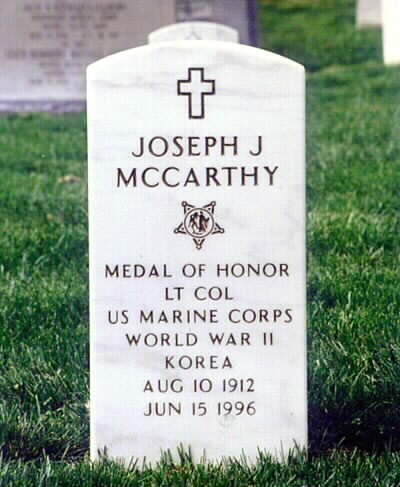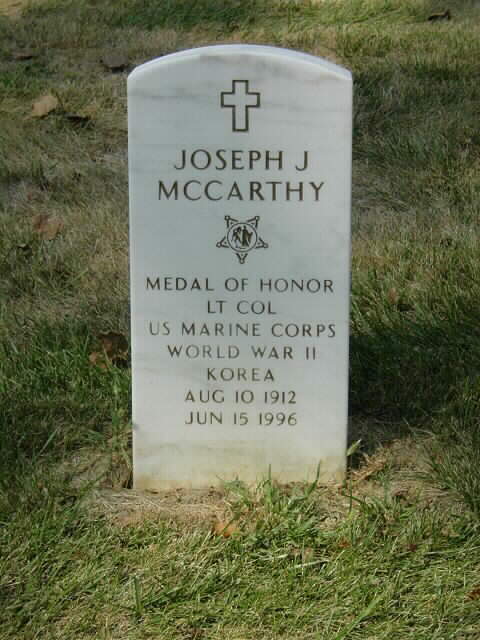Rank and organization: Captain, U.S. Marine Corps Reserve, 2d Battalion, 24th Marines, 4th Marine Division. Place and date: Iwo Jima, Volcano Islands, 21 February 1945. Entered service at: Illinois. Born: 10 August 1911, Chicago, Illinois.
Citation:
For conspicuous gallantry and intrepidity at the risk of his life above and beyond the call of duty as commanding officer of a rifle company attached to the 2d Battalion, 24th Marines, 4th Marine Division, in action against enemy Japanese forces during theseizure of Iwo Jima, Volcano Islands, on 21 February 1945. Determined to break through the enemy’s cross-island defenses, Captain McCarthy acted on his own initiative when his company advance was held up by uninterrupted Japanese rifle, machinegun, and high-velocity 47mm. fire during the approach to Motoyama Airfield No. 2.
Quickly organizing a demolitions and flamethrower team to accompany his picked rifle squad, he fearlessly led the way across 75 yards of fire-swept ground, charged a heavily fortified pillbox on the ridge of the front and, personally hurling hand grenades into the emplacement as he directed the combined operations of his small assault group, completely destroyed the hostile installation. Spotting two Japanese soldiers attempting an escape from the shattered pillbox, he boldly stood upright in full view of the enemy and dispatched both troops before advancing to a second emplacement under greatly intensified fire and then blasted the strong fortifications with a well-planned demolitions attack.
Subsequently entering the ruins, he found a Japanese taking aim at one of our men and, with alert presence of mind, jumped the enemy, disarmed and shot him with his own weapon. Then, intent on smashing through the narrow breach, he rallied the remainder of his company and pressed a full attack with furious aggressiveness until he had neutralized all resistance and captured the ridge. An inspiring leader and indomitable fighter, Captain McCarthy consistently disregarded all personal danger during the fierce conflict and, by his brilliant professional skill, daring tactics, and tenacious perseverance in the face of overwhelming odds, contributed materially to the success of his division’s operations against this savagely defended outpost of the Japanese Empire.
His cool decision and outstanding valor reflect the highest credit upon Capt. McCarthy and enhance the finest traditions of the U.S. Naval Service.
DELRAY BEACH, Florida — Joseph Jeremiah McCarthy, the Chicago firefighter whose heroic dash across a killing field in World War II’s Battle of Iwo Jima earned him a Medal of Honor, has died. He was 83.
The war hero had suffered from heart disease the past year, then developed pneumonia about six weeks ago, according to Anthony Forgione of Pompano Beach, a World War II Marine buddy who fought alongside McCarthy in the island-hopping Pacific campaign against the Japanese.
Colonel McCarthy died Saturday night at Delray Community Hospital. Burial was set for Monday at Arlington National Cemetery after memorial services today at Holy Name Cathedral in Chicago.
“I’d rather have one of these than be president,” President Harry Truman told McCarthy when he decorated the Chicagoan in a White House ceremony on October 5, 1945.
Last year, on the 50th anniversary of Iwo Jima, Mr. McCarthy went to Arlington to honor his fallen comrades.
Earlier, in 1949, Mr. McCarthy drove from Maine to North Carolina, paying visits to the families of 26 of his buddies. Each one of them, he said, had been just as brave as he was on Iwo Jima — but not as lucky.
“He was not a one-shot hero,” Mr. Forgione said Monday. “He was a hero at every campaign and everything he did.”
McCarthy wished there would never again be a need for battlefield heroes. “I would hope and pray there never be another Medal of Honor issued,” Mr. McCarthy said in a 1992 interview. “I hope and pray there’s never any more wars. But we’ve got to remain strong.”
On February 19, 1945, about 60,000 Marines went ashore on Iwo Jima, an 8-square-mile island of rock, volcanic ash and black sand. Two days later, McCarthy led his men, zig-zagging across a 75-yard field swept by enemy fire from in front and on both sides. He took one Japanese pillbox single-handedly, then led the storming of a second.
“I was scared all the time,” McCarthy said later. “Any man tells you he wasn’t scared was an imbecile. But you dealt with it.”
The 36-day battle for Iwo Jima took the lives of nearly 7,000 Americans and about 20,000 of the 22,000 Japanese defenders.
After World War II, Mr. McCarthy went right back to work at the Chicago Fire Department. He retired in 1973, and split his time between homes in Wisconsin and Delray Beach. His wife, Anita, died in 1978. The couple had no children.
Michael Robert Patterson was born in Arlington and is the son of a former officer of the US Army. So it was no wonder that sooner or later his interests drew him to American history and especially to American military history. Many of his articles can be found on renowned portals like the New York Times, Washingtonpost or Wikipedia.
Reviewed by: Michael Howard


